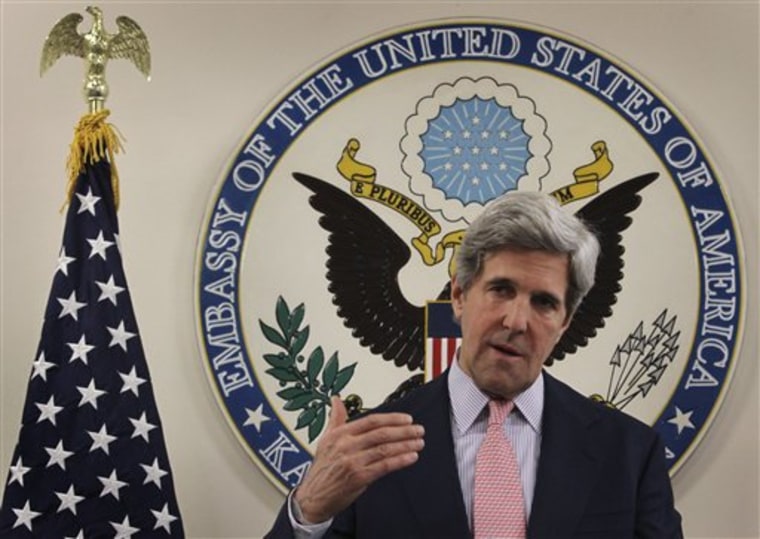U.S. Sen. John Kerry warned Sunday that already shaky U.S.-Pakistani relations have reached a critical juncture as calls grow in the United States to cut some of the billions of dollars in aid to Islamabad following al-Qaida leader Osama bin Laden's killing.
Kerry, who spoke in Afghanistan before traveling to Pakistan, said sober and serious discussion was needed to resolve the widening rift amid growing suspicion that Pakistan's security forces were complicit in harboring the al-Qaida leader, who was killed May 2 in a raid by U.S. Navy SEALs not far from Islamabad.
For its part, Pakistan is angry that it was not told about the raid in Abbottabad until after it was completed. That prompted accusations that its sovereignty had been violated.
Kerry — chairman of the influential Senate Foreign Relations Committee and the most senior American official to travel to Pakistan since the raid occurred — sounded a hopeful tone.
"I think for the moment we want to be hopeful and optimistic that we can work our way through this, get over this hiccup, and find a positive path forward," he said.
Moving forward
But he made clear that patience was running thin in Washington after it was discovered that the terror leader had been living for years in a compound in a military garrison town that includes Pakistan's equivalent of West Point.
"I think the important thing here is not to get into a recriminatory finger pointing, accusatory back and forth. The important thing is to understand that major, significant events have taken place in last days that have a profound impact on what we have called the war on terror, a profound impact on our relationship as a result," Kerry told reporters in the Afghan capital.
He added that "we need to find a way to march forward if it is possible. If it is not possible, there are a set of downside consequences that can be profound." He did not elaborate.
There are growing calls in the U.S. House and Senate to cut billions of dollars in aid to Pakistan.
"It is no secret that there are members of Congress who have made a call for a change in the aid program," Kerry said.
Kerry, a Democrat from Massachusetts, was making one of the most significant visits to Pakistan by an American official in years.
High stakes
In an indication of the seriousness of the visit, Pakistani President Asif Ali Zardari, Prime Minister Pakistani Prime Minister Yousuf Raza Gilani and army chief Gen. Ashfaq Parvez Kayani met ahead of Kerry's arrival later Sunday.
Much is at stake. The United States needs Pakistan's cooperation if it hopes to find a solution to the Afghan war and help a reconciliation process that hopes to fashion a nonmilitary solution to the Taliban insurgency. It also needs Pakistan's military help against insurgents using its lawless tribal areas to stage attacks against American, coalition and Afghan forces.
It also needs to ensure that nuclear-armed Pakistan does not succumb to rising Islamic extremism and its own tenacious insurgency, which has cost the lives of thousands of soldiers and civilians.
Pakistan also has much to lose. Its failing economy desperately needs American and other foreign aid. Since 2002, Pakistan has received more than $20 billion from the U.S., making the country one of the largest U.S. aid recipients, according to the Congressional Research Service. Nearly $9 billion of that has been in the form of reimbursements for Pakistan's costs to support the U.S.-led military campaign in Afghanistan.
Kerry, who has been a supporter of Pakistan in the past, spent the weekend in Afghanistan meeting with Afghan President Hamid Karzai, his Cabinet and U.S. military officials pursuing the campaign against the insurgency.
Although he lauded Pakistani help in the past, including allowing American intelligence personnel to operate in Pakistan, — which he said had helped the U.S. track bin Laden — he also said he was concerned about some of Pakistan's actions.
Insurgent sanctuaries
Kerry said that during a visit to Khost province, located on the eastern border with Pakistan, he was briefed on Taliban and insurgent safe havens just across the frontier in North Waziristan, used to launch attacks. The Pakistani military has so far not gone after the safe havens.
"Yes, there are insurgents coming across the border," Kerry said. "Yes, they are operating out of North Waziristan and other areas of the sanctuaries. And yes, there is some evidence of Pakistan government knowledge of some of these activities in ways that is very disturbing. That will be without any question one of the subjects of conversation."
But he also said that bin Laden's death may present a new opportunity for reconciliation with the Taliban in Afghanistan.
Kerry's trip also comes amid growing condemnation of the U.S. raid as well as frequent drone strikes from Pakistani leaders, military officials, the Parliament and Islamic hard-liners.
Parliament has threatened to stop U.S. and NATO supply convoys if the strikes continued.
A prominent hard-line Islamist leader with suspected militant ties drew at least 4,000 people to a rally in the Pakistani city of Lahore on Sunday in support of bin Laden and against the U.S.
Hafiz Saeed, the leader of Jamaat-ud-Dawa, called bin Laden a martyr and demanded the Pakistani government break ties with the U.S. for killing him.
Jamaat-ud-Dawa is believed to be a front for the militant group Lashkar-e-Taiba, which is suspected of carrying out a series of attacks in the Indian city of Mumbai in 2008 that killed 166 people.
